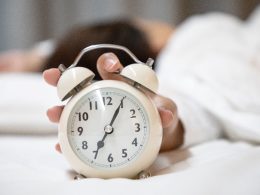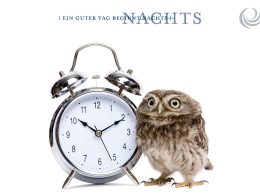Early birds enjoy a very good reputation in our society. After all, the early bird catches the worm, the early bird catches the worm and those who get up early get more out of the day. Early risers are not only compared to larks, which are famous for their enchanting song. They are also seen as doers, as people who can tackle and realise things and who are particularly efficient.
This is in stark contrast to the image that generally surrounds all those who like to sleep late. They are seen as sluggish, lazy, sleepy and generally less efficient. But where does this positive image of early risers come from and what is it about larks? Is it possible to train yourself to stop sleeping late and turn from a late riser into an early riser? We address all these questions in this article about getting up early.
What makes an early bird an early bird?
Whether you are an early riser, a late riser or something in between is genetically determined. Our internal clock, also known as chronotype in science, determines whether we belong to the group of people who tend to get tired and sleep earlier in the evening and then naturally get up earlier or not. It is also anchored in our DNA whether we get by well on five hours of sleep or whether we need eight, nine or even more hours of sleep.
Incidentally, the division into larks for early risers and owls for late risers is now considered outdated, even though the term “early bird” has become established for early risers. As sleep researchers have discovered, there are extreme forms of early risers as well as late risers, i.e. people who go to bed particularly early or particularly late. However, most people are somewhere in the middle when it comes to bedtime. In addition, the number of hours required for a restful night’s sleep varies from person to person. For example, there are short sleepers who go to bed late and are still fit early in the morning. On the other hand, there are late sleepers who need ten, eleven or even twelve hours of sleep to wake up refreshed, which is often difficult to reconcile with their social and professional lives.
Our personal sleep needs are far too complex to be categorised solely as larks or owls. If you would like to find out more about this, we recommend our blog post Which sleep type are you – owl or lark? in which we take a closer look at this topic.
Those who get up early are more successful
In fact, our society is completely geared towards early risers. Whether it’s work, school or kindergarten, everything starts early in the morning and therefore requires us to get up early, regardless of whether we get out of bed easily or would prefer to snooze for a few more hours. It is obvious that all those who have no problem getting up early and are fresh and refreshed have a clear advantage in our working world and society, which is fixated on the morning hours. For this reason, early risers are often not only more productive at school and at work, but also more successful than late risers.
This is also evident at school. Early risers who sit in class in the morning with an alert head get more out of the lesson and learn more easily than late risers who are torn from their much-needed sleep by the alarm clock and are therefore plagued by severe daytime tiredness. And later on in their careers, early risers naturally have a better chance and are more successful. For example, there are a particularly large number of people in management positions in companies who like to get up early and need little sleep.
Early risers are also portrayed in the social media as particularly efficient, dynamic, sporty and productive. Anyone who is part of the 5 o’clock team and has already completed a 10-km run, a yoga session or a round at the gym before work earns kudos and likes here.
Can you go from being a late riser to an early bird?
The social and professional advantages for early risers are obvious. This is why many late risers try to break the habit of sleeping late and become early risers. However, they are working against their internal clock, which can have a negative impact on their health and psyche in the long term.
Remember that our chronotype is just as genetically determined as the amount of sleep we need to regenerate and recover. If you are one of those people who fall asleep late due to your individual internal clock, who need eight or more hours of sleep and then naturally wake up late – without an alarm clock – it is difficult to train yourself to get up early. However, with great discipline, regularity and a few routines, it can be easier and quicker to get out of bed early in the morning: Good sleep hygiene is just as much a part of this as fixed bedtimes, sufficient sleep and exercise.
How early birds sleep best
The right bedding is also conducive to a good night’s sleep. Here we recommend our popular CONCERTO® range with an integrated silver content, which promises an excellent sleeping climate and hygienic freshness. The products in this range are also particularly suitable for house dust allergy sufferers. The CONCERTO® topper offers a high level of comfort and can be reversed depending on the season, as it has a summer and a winter side. The CONCERTO® fibre duvet is breathable, fluffy and cuddly. The fibre duvet is available in various sizes and warmth levels. The CONCERTO® fibre pillow has a fluffy and soft filling that is reminiscent of down. It is breathable, moisture-regulating and ensures long-lasting hygienic freshness thanks to the incorporated silver content. Those who prefer ergonomically shaped pillows can opt for the CONCERTO® neck support pillow, which offers maximum comfort and optimum support. With the help of removable insert plates, the neck support pillow can be customised to suit personal ergonomic requirements














